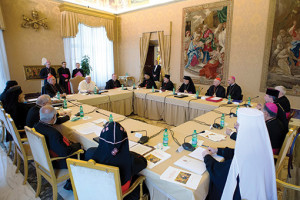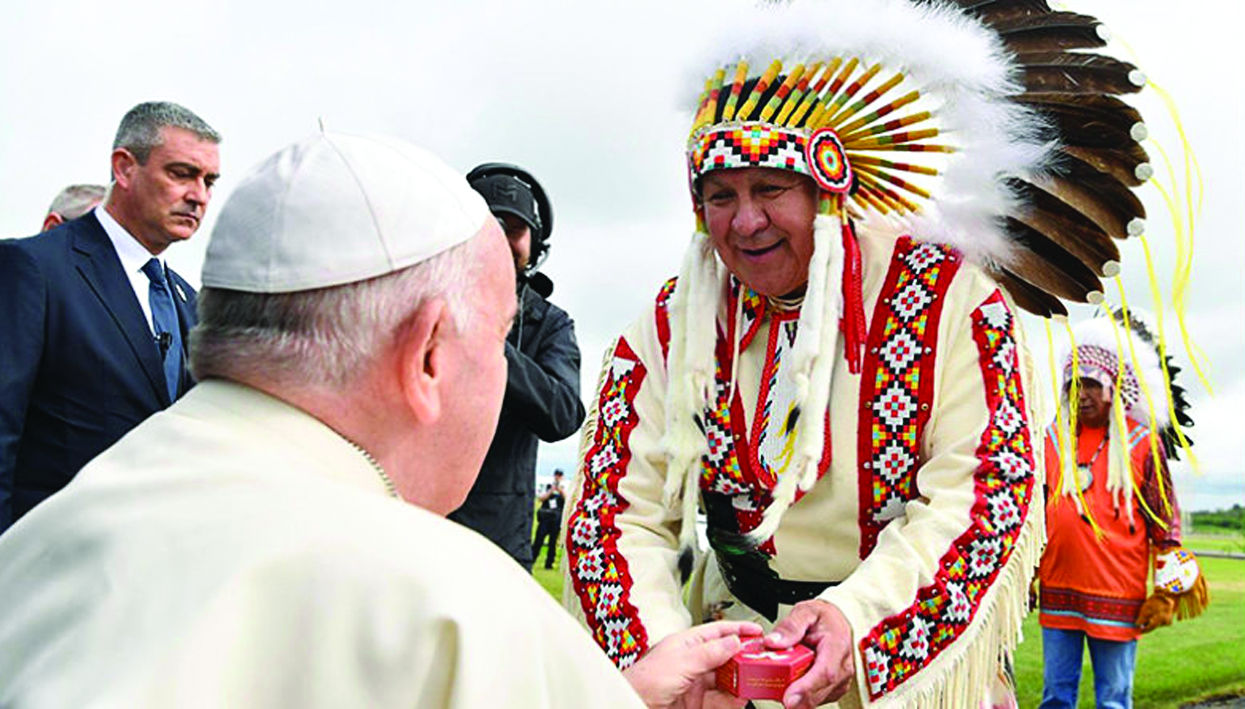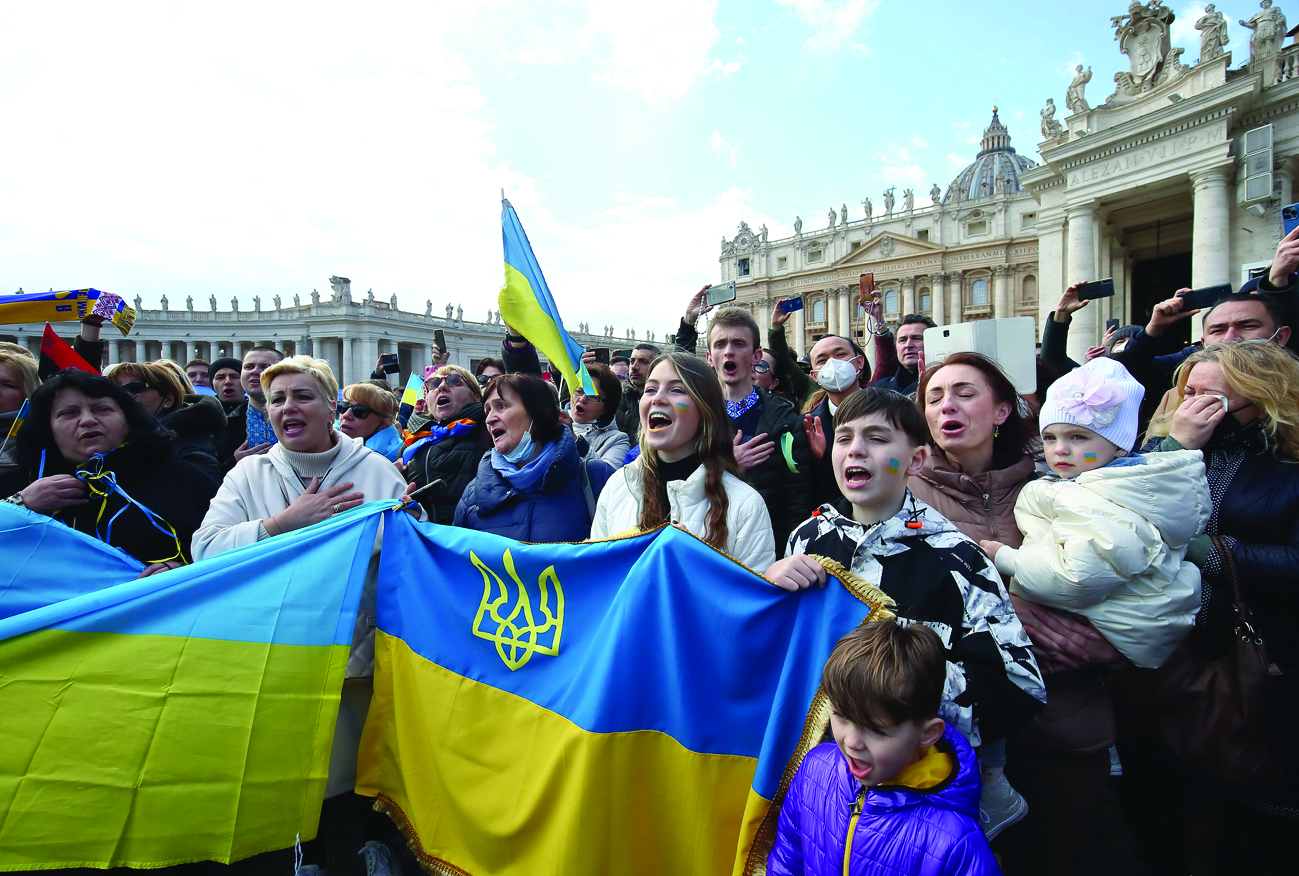The Holy Father met with the Patriarchs of the Eastern Catholic Churches at the Vatican on November 21.
As Bishop of Rome, the Pope meets with the heads of the Churches in communion with him to be updated on the life of particular Churches. Prior to announcing his trip to the Holy Land, the Pope met in November with the Patriarchs and Major Archbishops from the Eastern Churches at a plenary meeting of the Vatican’s Congregation for Eastern Churches.
Who are these bishops? The 11 current Patriarchs and Major Archbishops are:
— Patriarch Gregory of the Melkites
— Patriarch Cardinal Bechara Rai of the Maronites
— Patriarch Ignatius of the Syrians
— Patriarch Louis of the Chaldeans
— Patriarch Nerses of the Armenians
— Patriarch Ibrahim of the Copts
— Major Archbishop Sviatoslav of the Ukrainians
— Major Archbishop Lucian of the Romanians
— Major Archbishop George of the Syro-Malabars
— Major Archbishop Baselios of the Syro-Malankars
— Archbishop Fouad, Latin Patriarch of Jerusalem

Pope Francis attends a meeting with the patriarchs and major archbishops of the Eastern Catholic Churches in Syria, Iraq and and other parts of the Middle East.
This year’s meeting centered around the theme of religious liberty, an issue that is at crisis proportions around the world, even in the Western nations, but is particularly important in the Middle East.
Citing the words of his predecessor, Pope Francis said, “Your are watchful guardians of communion and servants of ecclesial unity.” He added: “That union, which you are called to realize in your Churches, finds natural and full expression in the ‘indefectible union with the Bishop of Rome.’ In order that our witness be credible, we are called ever to seek justice, mercy, faith, charity, patience and meekness.”
The current Pope, like the previous one, has a deep appreciation for the patrimony of Eastern Christianity.
The themes of the Second Vatican Council were at the center of Pope Francis’ speech to the Plenary Assembly of the Congregation for the Oriental Churches, but the Pope also spoke of peace and the fate of Christians in the Middle East.
After attending the meeting with just the patriarchs in the early morning of Thursday, November 21, the Pope received all the participants in the plenary meeting on the theme: “The Eastern Catholic Churches 50 years after the Second Vatican Council.”

A Muslim holding the Koran and a Coptic Christian holding a cross are carried through demonstrators in Tahrir Square in Cairo in 2011 (CNS photo).
It was an opportunity to reflect on the legacy of the Second Vatican Council for the Christian East, with particular reference to the decree Orientalium Ecclesiarum and its reception in later Magisterium, with the promulgation of the Code of Canons of the Eastern Churches (1990), the Apostolic Letter Orientale Lumen of Blessed John Paul II, and the Post-Synodal Apostolic Exhortation Ecclesia in Medio Oriente, signed in Lebanon by Benedict XVI in 2012.
In the heart of the Pope there are especially the sufferings of the Christians “who in many parts of the Middle East suffered particularly heavy consequences of the tensions and conflicts.”
After his two-hour private meeting with the patriarchs and major archbishops of the Eastern Catholic churches, Pope Francis prayed for peace and full religious freedom throughout the Middle East.
Referring to himself, he said, “The Bishop of Rome will not be at peace as long as there are men and women — of any religion —harmed in their dignity, deprived of what is necessary for their survival, robbed of their future or forced to become refugees.”
During the meeting with all of the members of the Congregation for Eastern Churches, the Pope added: “Let us make an appeal so that the right of everyone to a dignified life and to freely profess their faith is respected.” The large gathering followed the private meeting with the heads of Eastern churches and the Latin-rite patriarch of Jerusalem, mainly to talk about the situation of Christians in Syria, Iraq and other parts of the Middle East.
But Pope Francis said they also spoke about the rebirth of the Armenian, Ukrainian, Romanian and other Byzantine Churches oppressed under Communism in the 20th century, and the missionary dynamism of the Syro-Malabar and Syro-Malankara Catholic Churches based in India.
He said he listened to the patriarch of Jerusalem and the Coptic, Syrian, Melkite, Maronite, Chaldean and Armenian patriarchs testify to the perseverance of their faithful in the Middle East where they often are small minorities “in environments marked by hostility, conflict and even hidden persecution.”
“At times,” he added, “Syria, Iraq, Egypt and other areas of the Holy Land flow with tears.”
Despite the dangers and the desire of many Christians to move to places where they can raise their families in peace, the Pope said, “we cannot resign ourselves to thinking of a Middle East without Christians, who for 2000 years have professed the name of Jesus.”
The region’s Christians, he said, deserve to be recognized as citizens of their countries with full rights, including religious freedom.
Despite the challenges Catholics in the Middle East face, “the light of faith has not been extinguished, but rather shines brightly,” he said, and every Catholic owes them gratitude.
The world’s Christians can look to the Christians of the Middle East and learn the patience and hard work that go into “the daily exercise of a spirit of ecumenical and interreligious dialogue,” Francis continued. “The geographical, historical and cultural context in which they have lived for centuries has made them the natural interlocutors for numerous other Christian confessions and other religions.”
Pope Francis asked all Catholics to pray that God would bring reconciliation and peace to the region. “Prayer disarms the foolish and generates dialogue where there is conflict,” he said, adding that with sincere and persevering prayers the voice of Christians becomes “meek and firm, able to make even national leaders listen.”
Referring to Jerusalem as the place “where all of us were spiritually born,” Pope Francis prayed that Blesseds John XXIII and John Paul II, “untiring peacemakers on earth, would be our intercessors in heaven” to bring peace to the Middle East.
Patriarch Fouad Twal: “We must run the risk of educating if we are to stop violence”
Jerusalem, 7 November 2013. “We must run the risk of counting on education and training to stop violence.” This is the exhortation to believe in the power of education to bring about a positive transformation in the hearts of younger generations expressed by Fouad Twal, Latin Patriarch of Jerusalem. From the seat of the Patriarchate of Jerusalem he speaks of the Church’s commitment to schools and university education: “Today, November 7, I have received from Cardinal Bagnasco (the President of the Italian Bishops’ Conference) $600,000 for the laboratories of the new university which Benedict XVI and I founded in Jordan.” The university referred to by the Patriarch is the American University of Madaba, about 25 miles from Amman, the capital city, along the Incense and Spice Route known all over the world for its marvelous Byzantine mosaics.
In May 2009 the university received the support of Benedict XVI, who donated $20 million for this project and blessed the cornerstone of the campus during his visit to the Holy Land. “Developing the talent and noble inclinations of future generations of students,” said Benedict XVI in his speech, “will enable them to serve a wider community and to improve their living standard. Passing knowledge and instilling the love of truth in students will strengthen their values and individual freedom. Last, this intellectual formation will improve their critical thinking, will dispel ignorance and prejudice and help them break the spells of old and new ideologies.” Created by the initiative of the Latin Patriarchate of Jerusalem, which has jurisdiction over Israel, Palestine, Jordan and Cyprus, the American University of Madaba has its legal seat in New Hampshire, U.S.A., where the campus of the same name, with which it is associated, is located. A Jordanian prince presides over the board of directors of the Catholic university which opened its doors in 2011. With 17 faculties and 19 specializations, the university is now in its third year and has about 1,200 students of all religious faiths, “more female than male,” as Fouad Twal points out. Some 36 nationalities are represented. “All the Middle East is here,” the patriarch states with pride.
Education is therefore the first form of resistance to violence and increasing intolerance.
How can we ignore the difficult living conditions of Christians in the Holy Land? “We are and remain the Church of Calvary, owing to Israeli military occupation, the emigration of Christians, a terrorism which does not spare anyone, and a war a way out of which is yet to be found.” And if “we are still the Church of the Cross, we are also the Church of joy, of the empty grave, and our strength is just education and training,” so much so that “each parish has its own school and shows a deficit as they pay for the students’ fees.” On the other hand, “our seminary is always full — a miracle in such a tormented land where lots of faith is needed to stand up to the numberless abuses and forms of violence which people face in their daily life.”
“Life is hard for those Christians who stay here owing to increasing unemployment, exclusion from Israeli universities and negation of freedom of movement. The mystery about Jerusalem, which I cannot understand, is its bringing together different religious faiths and separating different believers.”
Speaking about the wall, now 250 miles long, which Israel has been building since 2002 separating its people from the Palestinian people, he keeps repeating: “How is it possible to build peace erecting walls?” The wall is the visual expression of the obstacles in “the hearts of men.” That is why, in order to achieve peace we need the conversion of the heart and soul; “then breaking down concrete walls will be easy as it will only take one day.”
—Mariaelena Finessi







Facebook Comments